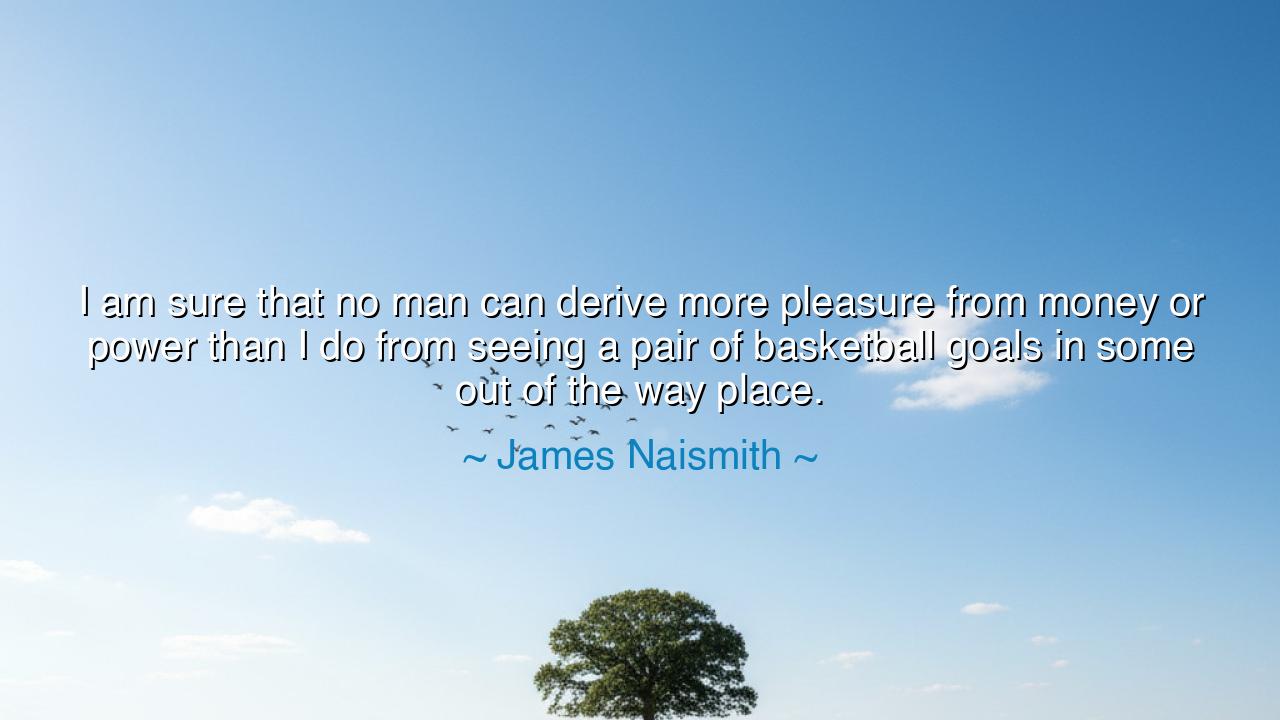
I am sure that no man can derive more pleasure from money or
I am sure that no man can derive more pleasure from money or power than I do from seeing a pair of basketball goals in some out of the way place.






Hearken, children of the ages, to the words of James Naismith, the father of a game that would echo across the world: “I am sure that no man can derive more pleasure from money or power than I do from seeing a pair of basketball goals in some out of the way place.” Herein lies a truth of the human spirit: that joy is not measured in riches, in dominion, or in fleeting accolades, but in the simple, pure delight of creation and the birth of possibility. The basketball goals, humble yet potent, symbolize the seeds of imagination sown into the world.
Naismith’s words reveal the value of contribution over conquest. While men may chase power or amass wealth, the architect of the game finds satisfaction in something eternal: a place where children, strangers, or strangers yet to meet, can engage in play, in challenge, and in community. The goals are not mere objects; they are portals to growth, joy, and the awakening of potential in others. The pleasure derived from them is the pleasure of the soul that nurtures life and inspiration.
Consider the tale of Naismith himself, who, in 1891, strung up two peach baskets in a gymnasium in Springfield, Massachusetts. With thirteen young men, he invented a game that would span continents, cultures, and generations. His delight did not lie in recognition or fortune, but in the simple act of facilitating play, in placing those goals “in some out of the way place” where imagination and effort could flourish. From humble beginnings, the echoes of his vision now fill stadiums and hearts worldwide.
In the eyes of the ancients, this wisdom was clear: true pleasure arises not from possession, but from the cultivation of life and opportunity. The athlete, the scholar, or the creator who witnesses growth, learning, and the awakening of others experiences a joy surpassing any material or temporal gain. Naismith’s reflection reminds us that the profound satisfaction of life is in enabling, in planting, and in seeing ideas and actions take root far beyond ourselves.
Thus, his words instruct: seek not merely the treasures of this world—its coins and crowns—but the deeper, enduring pleasure of contribution, creation, and inspiration. Even a simple goalpost, placed with care, can ignite passion, foster community, and transform lives. The gifts of the heart, the mind, and the spirit are worth far more than any riches that fade with time.
Carry this wisdom, children of generations yet to come: in the small, overlooked places, plant the instruments of joy. Let play, discovery, and inspiration be your currency, for it is through these humble acts that the soul finds its truest satisfaction. James Naismith teaches that greatness lies not in wealth or dominion, but in the simple, profound pleasure of seeing the spark of life in others’ eyes.






M6Huynh Nguyen Quang Minh 64
This quote feels almost nostalgic, like a reminder of when passion mattered more than profit. It makes me wonder whether we’ve lost that simplicity in how we view success. Would more people feel fulfilled if they focused less on personal gain and more on creating things that unite or uplift others? Naismith’s joy seems rooted in selflessness—and that’s something worth rediscovering in modern life.
NNMinh Ngoc Nguyen
I really love the image this evokes—basketball hoops in some distant corner of the world, connecting people through play. It’s such a humble, human kind of pride. It makes me think about how creators sometimes underestimate the ripple effect of what they start. Do you think inventors like Naismith feel ownership over their creations forever, or at some point do they just belong to the world?
TGVo Thanh Giang
This line makes me think about purpose and how we measure it. For Naismith, joy came not from power but from creation and connection. It’s almost spiritual in tone—the idea that happiness grows from giving something meaningful to the world. I wonder how many people today feel that kind of contentment in their work. Maybe that’s the secret: doing something that plants joy in unexpected places.
AAARMY AROHA
What stands out to me here is the contrast between material success and emotional fulfillment. It’s a reminder that the greatest rewards often have nothing to do with wealth. I can’t help but think about how many people chase external validation when real meaning might come from small, almost invisible acts that touch lives in quiet ways. Maybe impact isn’t about scale—it’s about sincerity.
MHTran Manh Hung
I find this quote deeply touching—it captures the purest kind of legacy. It makes me think about how creativity and contribution can outlast personal ambition. Imagine inventing something that brings people together across generations, like basketball has. I wonder if Naismith realized just how big it would become, or if the simple joy of seeing people play was enough for him. That kind of modesty feels rare now.